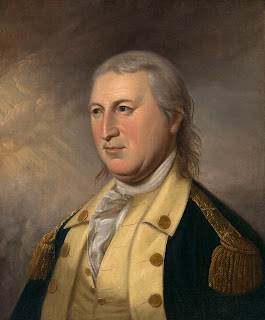Preparing For The Surrender - "As Any Of The Most Polished Nations"
Tuesday, October 17th, is the 246th anniversary of the British surrender at Saratoga. On that day in 1777, Major-General Horatio Gates, commander of the Northern Army of the United States, ordered his soldiers to be prepared.
Gates took steps took this step to prepare his men for the surrender - but was he ever expecting to capture Burgoyne's entire army? A year earlier, in the fall of 1776, the Northern Army had stopped a British invasion of the Champlain Valley. British forces, faced with the prospect of a winter siege of Fort Ticonderoga and Mount Independence, chose instead to return to Canada. In March of 1776, Major-General George Washington had agreed to a British evacuation of Boston to avoid destruction of the town, rather attempting an assault to force a surrender. At Trenton, New Jersey, in December of 1776, Washington succeeded in capturing an outpost on the British lines, and some 800 prisoners, but not an entire army.
“The regiment of riflemen under the command of Colonel Morgan and the company of Light Infantry under the command of Major Dearborn to be ready when ordered to take possession of the enemy’s lines, posts, and redoubts. The commanding officers of those troops are to be particularly attentive to the soldierlike and good behavior of their men.
The enemies of the United States have propagated an opinion among the British and German troops that the Americans are barbarians who pay no regard to the faith of treaties, and whose sole view is rapine and plunder. From the preceding glorious behavior of the army, the General is convinced that not an officer or soldier under his command will suffer the smallest infringement of the convention. Their general has pledged his honor, shall not in the least degree be invalidated. Let the British army, let Germany, let Europe and all the world know that the troops of the United States are not only great in arms, but that they are as tenacious of their honor and pledged public faith as any of the most polished nations under the sun.
The man detected in stealing the smallest articles from any of the prisoners, either in their quarters or upon their march, must expect to be tried by a General Court Martial, and if convicted, suffer death.” [1]
After the loss of Fort Ticonderoga and Mount Independence on July 6, 1777, simply stopping Burgoyne appeared to qualify as a success. In August a British expedition led by Lieutenant-Colonel Barry St. Leger down the Mohawk River valley had withdrawn from Fort Stanwix, and a foraging expedition sent out from Burgoyne's army was defeated at what became known as "The Battle of Bennington". Both were victories that weakened, delayed and hopefully would stop Burgoyne - a successful conclusion to the campaign even if it did not result in the capture of his army.
On September 24, 1777, fresh off his defeat in the Battle of Brandywine, Washington, wrote to Gates asking for the return Colonel Daniel Morgan's riflemen, explaining: "This Army has not been able to oppose General Howe’s with the success that was wished, and needs a Reinforcement..." He conditioned his request on Gates having been "... so fortunate, as to Oblige General Burgoyne to retreat to Tyconderoga...".
Gates, in his reply to Washington on October 5, 1777, did not seem to consider the capture of Burgoyne as likely as his retreat. He advised Washington that since the Battle of Freeman's Farm on September 19th: "... neither side have given Ground an Inch. In this Situation, Your Excellency would not wish me to part with the Corps the Army of General Burgoyne are most Afraid of. From the best Intelligence he has not more than Three weeks provision in Store; it will take him at least Eight Days, to get back to Ticonderoga; so that, in a fortnight at farthest, he must decide, whether he will Rashly risque, at infinite Disadvantage, to Force my Camp, or Retreat to his Den. In either Case, I must have the fairest prospect to be Able to reinforce Your Excellency, in a more considerable Manner than by a Single Regiment."
Does it matter much how Gates and his men treated their prisoners? Eighteenth century New Englanders apparently thought so. In commenting on the passing of the Convention Army, the Massachusetts Spy, published in Worcester, Massachusetts, printed a notice dated November 11, 1777, that noted: "The greatest boast of Britons formerly, was the humane treatment of their prisoners...". [2]
Americans remember the mistreatment of their own service members who were captured, be it during the Civil War, in World War II at Bataan or in the Battle of the Bulge, or in Vietnam. Americans may also remember the mistreatment and torture of prisoners during the Iraq War at the Abu Ghraib Prison [warning - link contains violent and disturbing content] that came to light in 2003, and was described by President George W. Bush as "abhorrent" and "a stain on our country's honor and our country's reputation".
Gates it seems was justified in making clear his expectations to his men, and his soldiers should indeed be remembered as "tenacious of their honor".
[1] Snow, Dean, American Orderly Books, pp. 17-18.
[2] Massachusetts Spy, Worcester, MA, Vol. VII, No. 342, November 21, 1777.
For more on the Convention Army's 1777 march from Saratoga to Boston, see:




In times of war civility is often lacking. This story highlighted Leadership in desperate times of war.
ReplyDelete